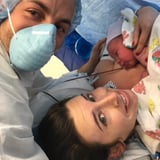mardi 11 septembre 2018
Women Want to Rename C-Sections - and the New Name They've Chosen Might Just Reverse the Stigma

You didn't actually give birth. You took the easy way out. You failed as a mother.
Those are just a few of the phrases women who've undergone cesarian section deliveries have had to endure, often by complete strangers on the internet. It's no surprise, then, that many new moms feel immense shame, regret, and guilt if they end up having to go this route during childbirth. The stigma, like the scar on their midsection, might lessen over time, but it never seems to go away.
"A C-section was the last thing that I wanted," Jordan Grissom told POPSUGAR.
Jordan, who works as a health coach in California, had researched "so many things" during her pregnancy, but she never allowed herself to look into "getting my stomach cut open" - it just wasn't an option. But, like many births, hers was unpredictable. She was induced a week after her due date, and when a midwife checked her progression, she found that Jordan was 9.5 centimeters dilated . . . and the baby was breech. They told her she'd need an emergency C-section.
"It reminds everyone that a birth did indeed happen, not just a surgery."
"I was petrified - I immediately went into a tailspin," she recalled. So did her body. Although an ultrasound quickly confirmed that her baby was not, in fact, breech, she regressed back to only six centimeters. Her birth team believed that once she heard the word C-section, "my cervix literally shut itself down out of fear."
Because she also was developing a fever, they decided to proceed with the C-section. Jordan was devastated, and it was then that her doula, Flor Cruz, approached. "She began to comfort me by explaining that although this wasn't what I wanted, I was still going to be birthing a beautiful baby girl. I was just going to be having a belly birth rather than a vaginal birth."
And with that, a new, empowering term stuck in Jordan's head.
"A belly birth is exactly what a C-section is," she said. "You're birthing your child through your belly, and it's just as significant as a vaginal birth." Plus, she said, it "sounds less procedural," which "pushes the point that we too have given birth."
Although it was a novel concept to Jordan, Flor had been using the phrase with her patients for years and even helped her to come to terms with her own birth struggles.
Flor decided to become a doula after her first birth, a vaginal delivery that left her feeling like she had no control and had buckled at the pressure of hospital staff. "The day I gave birth was the day I learned that my birth wasn't mine," she told POPSUGAR. Then, with her second, she had a C-section. "I felt so powerless," she said. "I didn't feel like I was at a birth. I felt like I was just waiting for someone to pull my baby out of me." Her third birth, however, changed her forever. She was able to have a successful VBAC, a vaginal delivery following a C-section, and finally felt as though she'd had a choice.
"I felt this huge urge to find empowerment for all births," she said. During her research, she stumbled upon the term belly birth, and "a lightbulb turned on." She explained:
"We already know that words are powerful - our language and how we use it. Change the language, change the mindset. Change the mindset, and it changes the experience like a chain reaction. I started incorporating the term as much as I could. I realized that using the term religiously was a good place to start changing the views on belly births. We connect more to the surgery aspect when we say cesarean or C-section. We are describing the act of major abdominal surgery. We don't necessarily highlight and celebrate the bringing forth of life. The joy of a child being born. Parents being born. It's far more inclusive. It reminds everyone that a birth did indeed happen, not just a surgery."
Not only does the term provide families with a positive way to speak of their births and thus serves as a step in the healing process, but it's also a term with no negative stigma surrounding it. "It provides a way to connect to the birth on a deeper level," she said.
"Many women end up feeling as though they've failed by having a C-section, and that's just not the case. Belly birth is birth."
Flor told POPSUGAR that the term has also opened the door to other meaningful conversations. Clients realize that they have a choice in how they speak about a cesarean. "And if they have a choice in that, what else do they have a choice in?" Flor said. "It prompts them to ask more questions, do more research, and make their own informed decisions. It preps them to be in the driver's seat in the event of a belly birth."
Jordan couldn't agree more.
"There are some people who see C-sections as an easy way out," she said. "I'm not sure why, it was certainly not easy - physically or mentally. Like myself, many women are not prepared for the procedural side of a C-section. The bright lights, the medical jargon, the lack of intimacy. Many women end up feeling as though they've failed by having a C-section, and that's just not the case. Belly birth is birth."










0 comments:
Enregistrer un commentaire